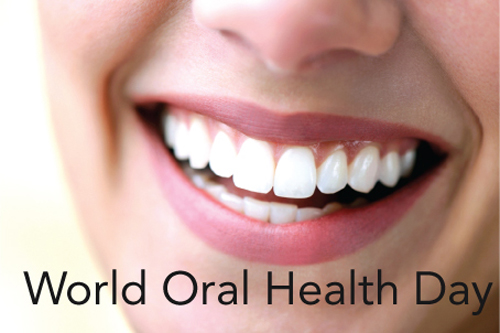Dr Parveen Akhter Lone
Oral health is poor in people with inherited bleeding disorders .Therefore early & ongoing dental care in this patient group is of particular importance in avoiding invasive procedures at latter date. Oral Health Day (WOHD) is celebrated every year on 20 March. It is an international day to celebrate the benefits of a healthy mouth and to promote worldwide awareness of the issues around oral health and the importance of oral hygiene to looking after everyone old and young.Efforts are focussed on protecting the teeth and mouth of the population throughout life, from childhood to adulthood. The theme is World Oral Health Day for 2016 is Celebrating Healthy Smiles because having a healthy mouth is cause for celebration!
It is a day for people to have fun – a day that should be full of activities that make us laugh, sing and smile .Your oral health contributes to your overall health.And by practicing good oral hygiene habits you can help prevent tooth decay, gum disease and possibly some serious health issues Here are some healthy tips for the children having haemophilia to smile for life.
Hemophiliais agroup hereditarygenetic disorder that impairs the body’s ability to control blood clotting which is used to stop blood bleeding when a blood vessel is broken.There are two types of Hemophilia A & B.Hemophilia A is the commonest accounting for 85% of all cases of Hemophilia (incidence 1:5,000 live male births) & characterized by deficiency of factorVIII. Hemophilia B is characterized by factor 1X (incidence 1:30,000 live male births) There is spectrum of severity of Hemophilia defined as Mild, Moderate & Severe according to plasma levels of FVIII or FIX .Mild Hemophilia bleed only after surgery ,may not be diagnosed until a procedure such as a dental extraction causes a prolonged bleeding .Moderatehemophilia have few spontaneous bleeds but bleeds after minor trauma .Severe hemophilia have frequent spontaneous bleeds into muscles & weight bearing joints.
Dentist plays a very crucial role in overall good health of all in general & in particular those with Hemophilia& other bleeding disorders. People who have bleeding disorder often require infusions of clotting factors or other medications to control bleeding. Patients with inhibitors to FVIII or FIX therapy should be managed by optimal prevention and early diagnosis along the philosophy of a ‘MinimumIntervention in Dentistry approach
The two main dental diseases affecting all persons, including those with hemophilia are:
Dental caries or Tooth decay
Dental caries, commonly known as dental decay, is a diet-related transmissible infectious diseaseof the tooth structure whereby bacteria and bacterial by-products dissolve tooth structure.
The main cause of tooth decay are unrestricted eating of sugars which is found in various forms like sweets cake, biscuits, chocolates,candis & soft drinks .
When there is continuous exposure to acidic attacks by continuous eating or drinking with any sugar-containing foods, then the acid attacks could proceed all day. This would result in rampant decay which will progressively cause the teeth to decay within a very short period and then to become unrestorable. This would have a catastrophic effect on any hemophilia patient particularly where replacement factor was unavailable or even restricted.
Each “acid attack” lastsabout 20 minutes.
After repeated “acidattacks,” your teethbecome weak, and a holeor “cavity” is formed.
People who have bleeding disorders should be taught from an early age to understand the importance of taking good care of their teeth and gums to prevent the need for invasive procedures which would require pre-treatment with expensive medication as well as longer recovery periods.
Prevention it must be remembered that for patients with hemophilia prevention of dental diseases is better, cheaper and safer than the treatment .So The delivery of dentistry has moved away from a treatment-focused approach to a preventive model of care. Standard prevention is suitable for children who are low caries risk and enhanced prevention for children at increased risk of caries or allocated to a high caries risk category due to other factors (for example, a medical condition). All children with congenital bleeding disorders would be allocated as high caries risk due to the complexity and morbidity of treatment when caries does occur in this group of patients. The prevention of dental problems is an essential component of oral care.. Emphasis is placed on the importance of regular dental follow-up, with fluoride varnish (5%) placed three to four times per year, and the principles of tooth brushing to prevent dental caries and periodontal disease by removal of the biofilm of dental plaque
In compliance with the guidelines of the World Federation of Hemophilia, we recommend the following:
* Brush teeth and tongue for two minutes at least twice a day.
* Use a toothbrush with soft bristles and brush gently so you do not damage your gums.
* Don’t share toothbrushes.
* Get a new toothbrush every six months, use fl uoride toothpaste.
* Clean between your teeth with dental fl boss at least once a day.
* Use mouth washes containing antibacterial & astringents like chlorhexidine
Avoid tobacco products
All tobacco productsare harmful, including”chew!” They cause:
* Stained teeth
* Bad breath
* Gum disease
* Addiction
* Mouth and throat cancer soIf you are thinking about smoking – don’t start. And if you smoke – quit before the damage is permanent
Nutrition Tips for a Healthy Smile
* Drink water or low-fat milk and stay away from sugary drinks like soda.
* Don’t eat too much candy or desserts that are high in sugar and stick to your teeth.
* Eat plenty of fruits and vegetables, meat & dairy products to promote healthy gums and teeth.
(The author is Prof & Head department of Oral & Maxillofacial surgery IGGDC Jammu)
Trending Now
E-Paper


